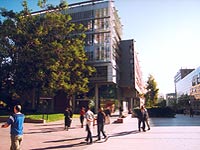|
||||||||||||||||||||||||||
| Physical Metallurgy - MATSE13135 | ||||||||||||||||||||||||||
This entry lists professional electives for a major in Physical Metallurgy within the program 3135.
Physical metallurgy involves the shaping, alloying, heat treatment, joining, corrosion protection and testing of metals. This plan is designed to produce graduates with training appropriate to both the metal and product manufacturing industries. The profession is very broad and includes careers in metal manufacturing companies, product manufacturing companies (e.g. white goods, automotive, aircraft), utilities, airline overhaul and maintenance operations, consulting companies and research organisations. Graduates may be employed in production, technical control and development, quality assurance, technical marketing and management.
Physical Metallurgy is introduced comprehensively in Stages 3 and 4 by a number of professional electives. Students also undertake a materials design project and a substantial thesis project. Students may complete the first one or two years of their degree at their local university engineering school and then transfer with advanced standing to UNSW. Physical Metallurgy Professional Electives
|
||||||||||||||||||||||||||



